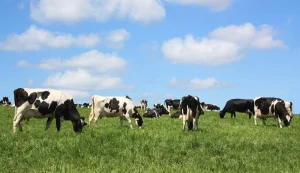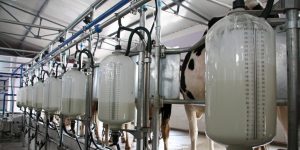
Nutrition and more specifically, malnutrition in residential aged care, sits alongside jobs and liveability in the regions and sustainability and productivity, as an advocacy priority for Australian Dairy Farmers (ADF).
The health benefits of dairy products are undisputed, yet their role in the aged care industry has not been fully appreciated. Until now.
Research by the University of Melbourne and Austin Health shows a dramatic impact on reducing fractures and falls among aged care residents can be achieved when they do something as simple as eating more dairy products.
Results of the two-year trial, which monitored the health of almost 7200 residents from 60 aged care facilities across Victoria, were published in the British Medical Journal late last year.
Previous work from the trial found that many aged care residents were malnourished and typically consumed half the intake of dairy foods recommended in the Australian Dietary Guidelines. This finding is shocking.
The research revealed that when residents had their daily intake of dairy lifted from two to 3.5 serves a day, there was a significant reduction in fractures and falls. Muscles in the arms and legs were maintained and falls were reduced in those residents given additional dairy foods. There was an overall 33 per cent reduction in fractures, including a 46pc dip in hip fractures and an 11pc decrease in falls.
Although there may be perceptions that higher dairy intakes in residential aged care are an expensive way to treat falls and fractures, there is no proof of this extra cost. What is clear are the enormous benefits.
In evidence presented to the Royal Commission into Aged Care Quality and Safety, it was estimated that hip fractures to residents in residential aged care add $313 million per year to the national health bill.
And while it may not be the first thing people may think of, dairy foods can be part of the solution by improving the health of those in aged care.
For this to occur the Australian Government needs to develop mandatory minimal nutritional standards for aged care service providers. These standards should be set consistent with the research and Australian Dietary Guidelines. It should apply across the entire aged care sector.
Pragmatically, there would be many financial benefits from increasing the dairy intake in aged care facilities. Domestic demand would be boosted, and there would be fewer costs to the aged care and health industries from improved health outcomes.
Yet it is more than this – it would send a signal more broadly that the Australian Dietary Guidelines, if followed more carefully by a greater number of Australians – could take some of the burden off the health care system.
Dairy foods like milk, yoghurt and cheese are rich in essential nutrients and provide health benefits, such as reducing the risk of heart disease, type 2 diabetes, hypertension, stroke, osteoporosis, and obesity.
Yet, most Australians do not consume anywhere near the required amount to achieve these outcomes.
More needs to be done by governments to improve the diets of Australians and reduce the burden on our health care system.
There are many policy instruments at their disposal such as improved regulation to achieve truth in food labelling that they can deploy.
Throughout the COVID-19 pandemic politicians have said to us they are acting to protect the health of Australians.
If this was the case, then addressing diet and lifestyle choices have to be part of their election platform. These nutritional health objectives are part of ADF’s 2022 Federal Election Policy Statement.
This statement details a series of strategies and initiatives to make people and the planet healthier.
At the ADF, we are passionate about wanting to resolve malnutrition among our elderly.
We know dairy foods can play a key role and we see the crisis in aged care and the election as the opportunity to make real change.
By working on issues like these, we do a public good in improving the health of all Australians and decreasing the number of people who need to seek medical care.
All people should eat a healthy diet and follow the Australian Dietary Guidelines to give them the best chance to be healthy.
We are determined to ensure dairy foods are given their rightful place in the diets of everyone from children to the elderly.
























